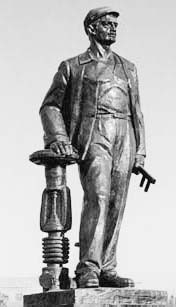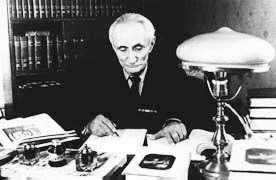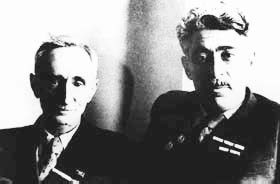|

Spring
1999 (7.1)
Pages
22-23
Oil Boom Period
in Azerbaijan
(1880s
- 1918)
Abdulla
Shaig
(1881-1952)
Undelivered Letter
A Short Story
In this
story set during Azerbaijan's Oil Boom at the turn of the 20th
century, Shaig reminds his readers that
drilling oil wells was a risky business. Oil workers often lost
their lives when a well gushed or when there was an explosion
in the well. Poverty and a lack of any other options left them
with no choice but to accept this risk. Here the oil barons are
portrayed as being callous about the tragic loss of life.
  _____ _____
From AzerbaIt was a frosty winter's day. The sharpness of
the cold burned your face. As though clad in mourning, the sky
was swathed in a heavy veil, while the mountains and valleys
were covered with a white shroud. Crows hopped warily about in
the snowdrifts on the street. Warmly-dressed, well-shod people
emerged from their cozy, well-heated homes and rode off in horse-drawn
carriages or went by foot. The icy day and bitter frost did nothing,
save please them.
Left: Statue to oil workers
in Baku.
Do all the sorrows and calamities of this world really only affect
the indigent part of humanity?
Gurban was sitting at the edge of the Shaitan Bazaar beside his
fellow-villager, Mullah Farzali, the street scribe who wrote
letters and appeals for the illiterate. Gurban was frozen. With
one hand he held the open collar of his threadbare shirt together,
and with the other he tried to pull his tattered shoe off his
foot, for it had frozen to his skin.
"Write a letter for me, Mullah. You know I always bring
you a profit. I only left our village a year ago, but this is
the fifth letter you'll be writing for me."
Mullah Farzali rubbed his stiff fingers, pulled out a scrap of
paper and laid it on his lap. "What do you want me to write?"
He stifled a yawn.
Do all
the sorrows and calamities of this world really only affect the
indigent part of humanity?
-Abdulla
Shaig (Early 20th Century)
Gurban moved
closer and began to whisper, as if he were sharing a great secret:
"First of all, greet the mother of my children. Tell her
to take good care of them and to cherish t hem. Then write that, praise be to Allah,
I am well. Tell her I'm sending 15 rubles with Gulam-Reza and
will send more in time for the holiday. I want the children to
have everything they need. Tell her I'll be home in late spring." hem. Then write that, praise be to Allah,
I am well. Tell her I'm sending 15 rubles with Gulam-Reza and
will send more in time for the holiday. I want the children to
have everything they need. Tell her I'll be home in late spring."
The Mullah dipped his pen into the inkwell. He was about to start
the letter, but the ink had become so thick it was impossible
to write. Mullah Farzali spat carefully into the inkwell, stirred
its contents with his penpoint and settled down to the work at
hand.
Abdulla Shaig, educator and author of the famous children's
story, "Fox Goes
on a Pilgrimage."
Gurban drew his worn-out cloak tighter around his body, covering
the bristly hair on his chest. Bending over double from the bitter
cold, he complained, "My new master is evil. The well we're
digging is more than 180 feet deep. We begged him to give us
more pay, because it's so hard going down that far, and the gas
fumes are killing us. But that bastard, the son of bitch, won't
give in. He said if we don't go on digging as agreed, he won't
pay us at all. It's hard to earn money here, Mullah. A man can
envy your trade: you write five or 10 letters a day, say a few
prayers for others and, praise be to Allah, you have enough to
eat. May Allah always provide for you! What else could a man
wish for?"
 Mullah
Farzali laid down his pen, pinched some sand from a hollow in
the wall and sprinkled it over the paper [for the ink to dry]. Mullah
Farzali laid down his pen, pinched some sand from a hollow in
the wall and sprinkled it over the paper [for the ink to dry].
"Ah, my friend, 'a fight always looks interesting from the
sidelines.' My job isn't to be envied, no matter what you say.
Summer and winter I sit at the crossroads, waiting for clients.
Sometimes my head begins to swim. There are days when I have
no work at all, so I sit here, rubbing my empty stomach."
The Mullah hivered, drew his cloak more tightly around his shoulders
and read the letter aloud.
Gurban listened intently. He gaped, as if he were about to swallow
the words that issued from the Mullah's mouth.
He seemed pleased
with the results, and at the close he said, his eyes lighting
up: "Mullah, add my requests to Gulam-Husein and ask him
to look after the children until I get back. Tell him to write
me a letter and tell me what happened to our red cow and whether
he sold the blind nag. And write that I'll bring Ana Khanum and
Memish each a printed red kerchief when I come home."
After Mullah Farzali had finished writing he folded the paper
carefully, slipped it into an envelope and said, "Whom should
I address it to?"
Photo:
The laborious
and dangerous work of digging oil wells at the turn of last century.
Azerbaijan National Archives.
  Gurban
scratched his head in confusion. "Just say that it should
be given to the mother of Gurban's children." Gurban
scratched his head in confusion. "Just say that it should
be given to the mother of Gurban's children."
Mullah Farzali addressed it and handed it to his client. Gurban
accepted it with trembling hands, examined it closely and was
about to put it inside his cloak when it slipped out of his stiff
cold fingers. He bent down quickly, snatched it up, brushed off
the frozen clumps of dirt and gently placed it against his chest.
Then he took a 10-kopeck piece from his pouch and put it into
the Mullah's hand. "Here. This is for you. I'll be back
before the holidays to order another letter. You'll be getting
a bit of business from me, just wait." He walked off, pressing
one hand firmly against the envelope.
Gurban was in a hurry to reach Gulam-Reza's house and give him
the letter and to add a few words of his own. He was thinking
that Gulam-Reza was a lucky man. He had been able to save up
a bit and was now going to return to their native village and
visit his own children. How beautiful everything would be there
in another month!
 The forests, mountains
and hills would be covered with an emerald carpet. The flowers
would be in blossom. The trees would be decked in green and the
swallows, those first heralds of spring, would have returned
from warmer lands. Then the starlings and cranes would return
to their old nests. Work would be in full swing in the fields
and gardens. The fishermen would set out on the rivers and lakes. The forests, mountains
and hills would be covered with an emerald carpet. The flowers
would be in blossom. The trees would be decked in green and the
swallows, those first heralds of spring, would have returned
from warmer lands. Then the starlings and cranes would return
to their old nests. Work would be in full swing in the fields
and gardens. The fishermen would set out on the rivers and lakes.
Ah, bitter poverty, what have you done to Gurban? You tossed
him into an alien place, tearing him away from his wife and children.
Writers Abdulla Shaig and Samad Vurgun. Azerbaijan National
Archives.
A lump rose in his throat. Then his heart froze, his knees buckled
and he collapsed on the powdery snow. When he regained consciousness
a few moments later he raised his head, feeling wretched and
terribly weak. Grand carriages, lively crowds and the happy faces
of self-satisfied, warmly-dressed people floated by. He glanced
at all those well-fed people with hatred and bitterness. A great
sigh escaped his pale lips.
Mustering his strength, he rose slowly, then quickly put his
hand inside his cloak to make sure the letter was still there.
Pressing it ever more firmly under his arm, he headed out for
his friend's place again.
The door was locked. This was an unexpected disappointment. Gurban
turned away sadly. As he wandered dazed through the crowds of
workers, he suddenly spotted Safar, another fellow-villager.
Gurban waved to him and learned that Gulam-Reza had gone off
to the city. "As soon as he gets back, tell him that I have
to see him before he leaves for the village. I want to give him
a letter and some money for my family, and tell him a few words
myself."
***
The master, Haji-Guli started yelling at them: "You scoundrels!
Loafers! When the well was shallow, I was the head and you were
the tail, and wherever I turned, you crawled after me. But now,
when it's deep, you want to become the head. Every day you make
a new ultimatum. Every day you come with new demands. You say
the well's too deep and it smells like death down there, and
other such nonsense. Imagine! You've lost all sense of decency.
What you need is a good beating!"
Safar and Tariverdi tipped over the tub of sand they had raised
from the bottom of the well and sent the tub back down again.
"We still are the tail, Agha," Tariverdi said. "You
know how dangerous it is working down there on the bottom now.
Look at its maw. Like a dragon lying in wait. A good conscience
is a good thing, you know."
"Look over there," Safar added, pointing to the oil
derricks in the distance. "Every inch of the ground there,
no matter where you sink a pick, you'll hit a worker's bones.
You can hear their moaning everywhere. And those who live in
these fine, tall houses"
"Go on and die if you want to," Haji-Guli shouted and
stamped his feet. "You think money comes easily? You risk
your lives, but we risk our fortunes."
"Safar! Hey, Safar! Gurban's yanking the rope down there."
The two workers ran back to the well. As they lay down on the
ground to look over the edge, a terrible roar of exploding gas
threw them back.
"God, be merciful," they whispered fearfully. "Now
Gurban's dead, too."
 Haji-Guli
seemed not to have heard. He walked over to the well and bent
over cautiously. His eyes lit up and his lips parted in a happy
smile. "There's an opening for the oil now! It'll come up
in a fountain!" Haji-Guli
seemed not to have heard. He walked over to the well and bent
over cautiously. His eyes lit up and his lips parted in a happy
smile. "There's an opening for the oil now! It'll come up
in a fountain!"
"What about Gurban's body, Haji? You mean it's going to
remain down there?" Tariverdi said with seeming indifference.
His words had a sobering effect on their master, whose eyes now
grew wide. Then he took two 25-ruble bills from his purse and
muttered, "HereThis'll be for whoever brings up the body."
Tariverdi looked over the side of the well and saw the bubbling
oil rising to the surface. "Poor Gurban. You dug your own
grave."
"Here," Haji said. "Take the money and divide
it between you, but not a word to anybody, hear?"
"What about his clothes, Agha?"
Haji placed his hand gently on Safar's shoulder and said, "Bury
them someplace here."
When they picked up Gurban's clothes, an envelope fell to the
ground.
"Poor Gurban. It was his letter that never got delivered."
From "Azerbaijanian Prose - an Anthology," edited
by Mirza Ibrahimov, Progress Publishers, Moscow, 1977.
From Azerbaijan
International
(7.1) Spring 1999.
© Azerbaijan International 1999. All rights reserved.
Back to Index
AI 7.1 (Spring 99)
AI Home
| Magazine
Choice | Topics
| Store
| Contact
us
|


 hem. Then write that, praise be to Allah,
I am well. Tell her I'm sending 15 rubles with Gulam-Reza and
will send more in time for the holiday. I want the children to
have everything they need. Tell her I'll be home in late spring."
hem. Then write that, praise be to Allah,
I am well. Tell her I'm sending 15 rubles with Gulam-Reza and
will send more in time for the holiday. I want the children to
have everything they need. Tell her I'll be home in late spring."
 The forests, mountains
and hills would be covered with an emerald carpet. The flowers
would be in blossom. The trees would be decked in green and the
swallows, those first heralds of spring, would have returned
from warmer lands. Then the starlings and cranes would return
to their old nests. Work would be in full swing in the fields
and gardens. The fishermen would set out on the rivers and lakes.
The forests, mountains
and hills would be covered with an emerald carpet. The flowers
would be in blossom. The trees would be decked in green and the
swallows, those first heralds of spring, would have returned
from warmer lands. Then the starlings and cranes would return
to their old nests. Work would be in full swing in the fields
and gardens. The fishermen would set out on the rivers and lakes.